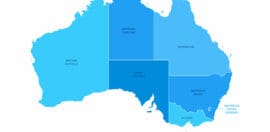The most important issue facing Australia? New survey sees huge spike in concern over climate change

27 November 2019 at 5:04 pm
Nearly half of Australians aged 18 to 24 view climate change as the biggest problem facing Australia in new national survey, writes Professor Andrew Markus from Monash University.
While most Australians still view the economy as the most important issue facing the country, a new survey released Tuesday shows climate change is rapidly becoming a major concern, as well.
Now in its 12th year, the Scanlon Foundation survey is the largest- and longest-running poll tracking public opinion on social cohesion, immigration, population and other issues in Australia.
The 2019 survey was administered by telephone and the internet in July-August to a representative sample of 3,500 respondents.
The largest change in the survey from 2018 to 2019 came with the open-ended question: “What do you think is the most important problem facing Australia today?”
Both years, the economy ranked as No. 1. But this year, climate change jumped to a clear second with the equal-largest increase from one year to the next, up from 10 per cent to 19 per cent in our telephone-administered survey and from 5 per cent to 17 per cent in the self-completed online survey.

Responses to the most important problem facing Australia in telephone-interview survey. Author provided.
As would be expected, there were major variances in the responses depending on demographics.
Nearly half (43 per cent) of those aged 18 to 24 viewed climate change as the biggest problem facing Australia, compared to 12 per cent of those aged 35 to 44 and just 8 per cent of those over the age of 75.
The responses also varied by state – 20 per cent of Victoria residents and 18 per cent of NSW residents said climate change was the biggest problem, compared to 8 per cent in Western Australia.
And there was a stark difference depending on political affiliation, with 54 per cent of Greens voters saying climate change was the most important issue, compared to 21 per cent of Labor, 7 per cent of Coalition and just 3 per cent of One Nation voters.
Less worry about immigration numbers
Last year, immigration was a major political issue in Australia. Several polls, variously worded and with different approaches to sampling, found majority support for a reduction in the numbers of immigrants permitted into Australia each year.
Prime Minister Scott Morrison said his government was listening to the public’s concerns and responded with changes, including a reduction in the annual immigration target.
This year, however, there is evidence of a decline in public concern.
The percentage of people who agreed the immigration intake was too high in the annual Lowy Institute poll fell from 54 per cent in 2018 to 47 per cent in 2019.
And in our poll, the proportion of those who agreed with a reduction in the number of immigrants fell marginally from 43 per cent in 2018 to 41 per cent in 2019 in our interviewer-administered survey and from 44 per cent to 41 per cent in the self-completed version.

Responses to the question about the number of immigrants in Australia in telephone survey. Author provided.
Endorsement of the value of immigration
There is continuing endorsement of the value of immigration by a substantial majority of Australians.
In the self-completed version of this year’s survey, 76 per cent agree that immigration is good for the economy, 78 per cent agree that immigration “improves Australia by bringing new ideas and cultures” and 80 per cent agree that multiculturalism has been good for Australia.
Since 2015, the survey has tested public support for immigration restrictions on the grounds of race, ethnicity or religion, which have been advocated by minor right-wing and populist parties. The consistent finding is that a large majority – 70 per cent to 80 per cent of Australians – do not support such policies.
But concerns remain over the impact of immigration
While public opinion is generally positive with regard to immigration today, many are concerned about the impact of rising immigrant numbers on their daily lives.
Seventy per cent of respondents said they were concerned about “overcrowding”, 60 per cent by the impact of immigration on housing prices and 58 per cent by the impact on the environment.
A new question in 2019 asked for responses to the proposition that “too many immigrants are not adopting Australian values”. Nearly two-thirds of respondents (67 per cent) agreed with the statement.
Policy towards asylum seekers
In 2018 and 2019, a new question asked respondents “are you personally concerned that Australia is too harsh in its treatment of asylum seekers and refugees?”
Opinion was found to be almost evenly divided. In 2019, 49 per cent said they were “a great deal” or “somewhat” concerned, 50 per cent “only slightly” or “not at all” concerned.
Here, too, there were major variances in viewpoints depending on demographics.
For instance, 87 per cent of Greens voters and 61 per cent of Labor voters were “a great deal” or “somewhat” concerned, compared to just 30 per cent of Coalition voters and 16 per cent of One Nation.
A similar split could also be seen with age, with 70 per cent of those aged 18 to 24 “a great deal” or “somewhat” concerned, compared to just 39 per cent of those aged 55 to 64. And with location: 55 per cent of Victoria residents were “a great deal” or “somewhat” concerned, compared to 37 per cent of those in Western Australia.
Social cohesion still relatively stable
On the much broader question of social cohesion, our survey continues to find a large measure of stability in Australia.
One indication is provided by the Scanlon Monash Index (SMI), which aggregates responses to 18 questions and measures attitudes in five areas of social cohesion: belonging, worth, social justice, political participation and acceptance of diversity.
Over the course of our 12 national surveys, the SMI registered the highest level of volatility during 2009-2013, the period of the Rudd and Gillard governments, when it declined by more than 10 per cent. It has been largely stable since 2014.
On the individual factors that comprise the SMI, however, there have been some significant changes. When it comes to sense of belonging, for instance, just 63 per cent said they felt this to a “great extent” in 2019, compared to 77 per cent in 2007.
And on the acceptance of diversity, 19 per cent of respondents said they had experienced discrimination on the basis of race, ethnic origin or religion, which was significantly higher than the 9 per cent to 10 per cent from 2007 to 2009.
About the author: Andrew Markus holds the Pratt Foundation Chair of Jewish Civilisation. He is a fellow of the Academy of the Social Sciences in Australia and is a past head of Monash University’s history program.
Markus received grants to research Australian public opinion from the Scanlon Foundation, the Australian Research Council and Australian governments.
This article is republished from The Conversation under a Creative Commons license. Read the original article.
![]()







